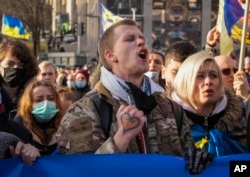Lviv, Ukraine – Western media have been keen to explain in sweeping geopolitical terms why Ukraine plays a role – probably for fear that readers and audiences may believe that the fate of a remote country on the outskirts of Europe does not matter to them.
But they may be preaching to the converts, according to a study by the European Council on Foreign Relations. The survey, published last week, showed that Europeans may be experiencing a “geopolitical awakening”, according to analysts at the Pan-European think tank.
Europeans in particular agree on three key ideas.
The respondents identified the Russian threat as a problem not only for Ukraine but for the security of the continent as a whole; they fear that Russia is indeed planning to invade Ukraine, despite the Kremlin’s denial and its ridicule of Western anxiety; and they want NATO and the European Union to respond to the crisis.
However, they remain less in agreement on what price their countries should pay to defend Ukraine or what sacrifices they are ready to suffer, with a noticeable east-west divide. Poles, Romanians and Swedes seem more willing than Western counterparts to make sacrifices, although the study as a whole found that Europeans are equipped for a possible influx of large numbers of war refugees, much higher energy costs, Russian economic retaliation for Western sanctions and disruptive Kremlin-controlled cyberattacks.
The survey was conducted in Finland, France, Germany, Italy, Poland, Romania and Sweden – which together account for almost two thirds of the EU’s population. More than half of those surveyed agree that Russia poses a threat to Europe as a whole.
Recognizes Ukraine
Ivan Krastev and Mark Leonard, analysts at ECFR, say there is “a surprising consensus” among European voters, who “would see another Russian invasion of Ukraine as an attack on not just a neighboring country, but on the European security system itself. “
It may surprise Russian leader Vladimir Putin, they add. In fact, it can. The Russian leader has long run a story that Ukraine is part of Russia. He declared to then-US President George W. Bush in 2008: “You must understand, George, that Ukraine is not even a country.”
In 2014, after annexing Crimea and using armed agents, later with the support of the Russian military, to seize part of Ukraine’s Donbas region, Putin said: “Russians and Ukrainians are a people. Kiev is the mother of Russian cities.”
Last year, he wrote a controversial 5,000-word treaty entitled “On the Historical Unity of the Russians and Ukrainians,” arguing that Ukraine can only be sovereign in partnership with Russia, and painting a picture of a Western conspiracy to undermine Slavic unity. Many authoritative historians dismissed Putin’s history lesson as eccentric and an exercise in myth-making, one that simplified Ukraine’s much more complex, turbulent, and tortured history.
 Ukrainians gather against a potential Russian invasion of Ukraine, in central Kiev, February 12, 2022.
Ukrainians gather against a potential Russian invasion of Ukraine, in central Kiev, February 12, 2022.
But the ECFR survey sheds light on how Europeans identify Ukraine as a full-fledged country, far from previously more dismissive Western attitudes.
In 1991, George W. Bush’s father, in what came to be known as the “Chicken Kiev” century, urged the Ukrainians not to declare independence when the Soviet Union collapsed, but to remain united with Russia.
“Six years after independence, many otherwise well-informed Westerners have either completely failed to register that they have a country called Ukraine as a neighbor or have vaguely heard of it but have no idea where it is,” lamented British author Anna Reid in his book “Borderland: A Journey Through the History of Ukraine.”
Ukraine’s dramatic Maidan uprising in 2014, also known as the Dignity Revolution, changed that, captured the attention and imagination of Europeans and put the country on the map. Trade and cultural contacts have increased dramatically since the Maidan revolt; Since 2017, Ukrainians have not had to secure visas to visit the EU’s Schengen zone, and tens of thousands of young Ukrainian people choose to study in the EU each year.
And Ukraine’s efforts to build state and nation since Putin’s ally Viktor Yanukovych were overthrown in 2014 have also been recorded, with, as the ECFR survey suggests, a continental understanding of why Ukraine’s sovereignty and survival mean much to other liberal democracies. , especially close neighbors such as Poland and the Baltic states.
Buffer state
For Poland, home to around one million Ukrainians, mainly economic migrants, Ukraine is an important buffer state that, as long as it survives, keeps Russia further away by almost another 1,000 kilometers. Poland was the first country to recognize Ukraine after its referendum on independence in 1991. Poles, like their counterparts in the Baltic states, fear a revanchist Russia on the grounds that if a border is crossed, so will others.
Ukraine’s importance to Poland has been emphasized by the country’s Prime Minister Mateusz Morawiecki, a former historian.
“Europe is on the verge of war,” he warned on Saturday. “Military conflict is no longer an unlikely scenario. It is a real alternative. For many generations of young Poles and Europeans, this is the closest they will have come to seeing such a scenario unfold.
“For years, the Western world has relied on the twenty-first century to be free of armed confrontation. Recent experience, however, provides sufficient evidence that Russian aggression is not an illusion but a sign that a new chapter is opening up in Western history.”
